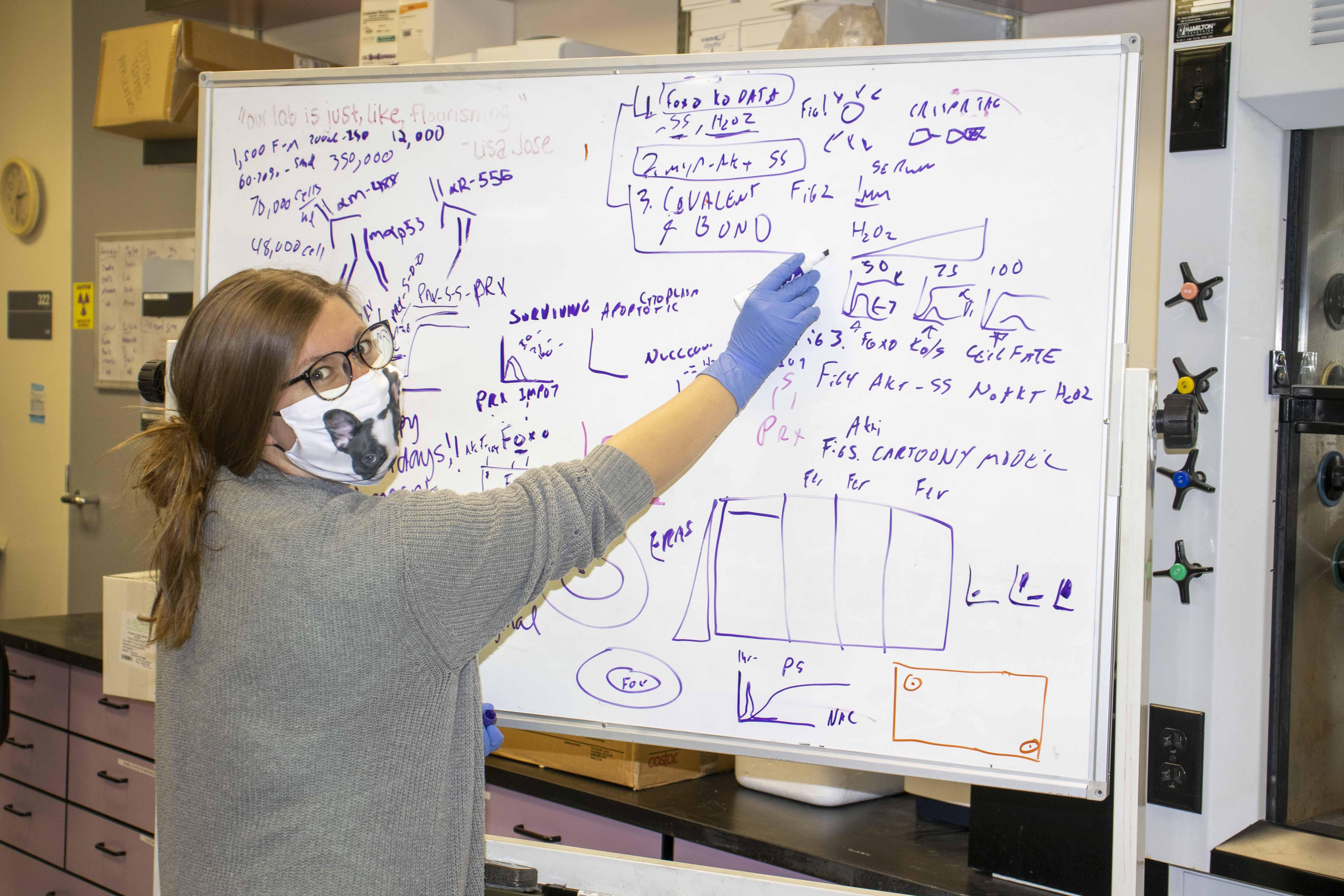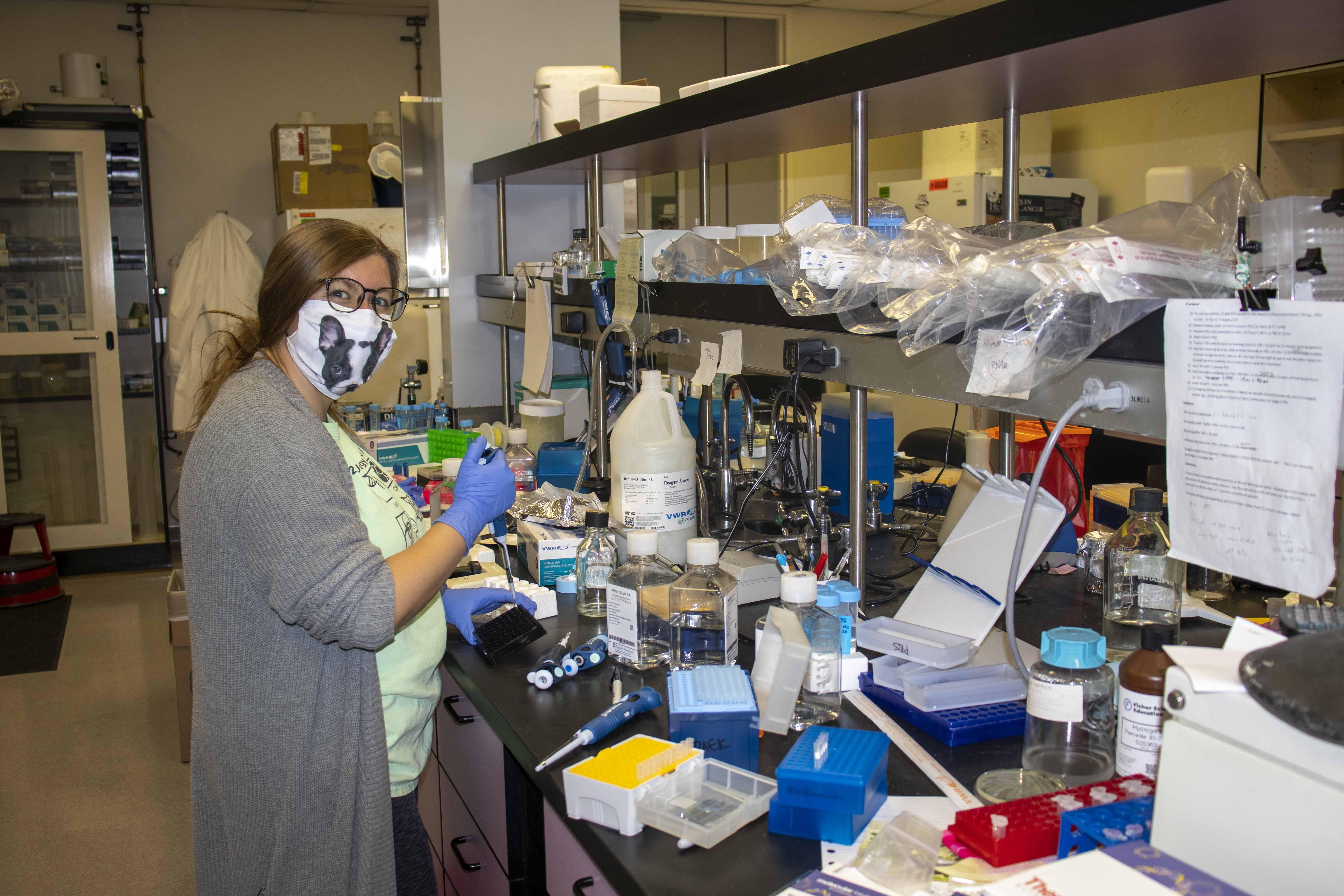Kathleen Lasick - MCB Outstanding Graduate for Teaching
 “This award is an honor! I have seen the recipients in the past and am amazed that I was the most qualified for this one. I am also humbled because so many of my colleagues are amazing! Winning this award is also a validation that I was still productive in a national pandemic; I worked from home for six months in the past year!” Kathleen Lasick told me when I asked her what winning this award meant to her. Each spring, the MCB Department recognizes outstanding graduate students in three categories: Scholarship, Service, and Teaching. This year’s Outstanding Graduate Student in Teaching was awarded to Kathleen Lasick, a MCB PhD student in Dr. Andrew Paek’s lab. The award for teaching is presented to the graduate student with a commitment to teaching or mentoring that goes above and beyond what is required, positive evaluations or other feedback from students and a willingness to help junior graduate students.
“This award is an honor! I have seen the recipients in the past and am amazed that I was the most qualified for this one. I am also humbled because so many of my colleagues are amazing! Winning this award is also a validation that I was still productive in a national pandemic; I worked from home for six months in the past year!” Kathleen Lasick told me when I asked her what winning this award meant to her. Each spring, the MCB Department recognizes outstanding graduate students in three categories: Scholarship, Service, and Teaching. This year’s Outstanding Graduate Student in Teaching was awarded to Kathleen Lasick, a MCB PhD student in Dr. Andrew Paek’s lab. The award for teaching is presented to the graduate student with a commitment to teaching or mentoring that goes above and beyond what is required, positive evaluations or other feedback from students and a willingness to help junior graduate students.
Teaching has been a passion for Lasick; she found herself teaching both informally and formally since high school. “I helped my high school and undergrad friends with the science and I loved doing it though it did not come naturally to me. It came with being with friends and talking about our classes and then with hands on experience.” As she was helping friends and then students, she learned to recognize the pattern of what works for students to understand each concept. “It's definitely learning as I go and coming up with new ways to explain things, which makes it fun.”
PhD students are required to be a Teaching Assistant (TA) for two semesters and Lasick enjoyed this so much that she plans to continue to TA after her required two semesters. She has been the TA for MCB 301, Molecular Basis of Life, for two years. During the pandemic MCB 301 moved to a “flipped classroom” format. Dr. Carol Dieckmann and the four TAs, including Lasick, had to rethink how they taught this class and adapted the course quicky so students could get the best learning experience during a remote learning situation. “I was TA'ing 301 in March 2020 when lockdown happened. That class worked well online because we had a big meeting with whole class over zoom, then we broke out in small groups in zoom and I worked with the small groups. I liked interacting with the students and working through when they got stuck. Each of the TAs led our own discussion group to review past week's material.” I’m glad I learned how to use Zoom because I think it will be helpful to increase access to education for students if they can’t do in-classroom learning for whatever reason.
Dr. Andrew Paek emphasized Lasik’s positive impact as an instructor. “From my own perspective, Kathleen has gone out of her way to teach other graduate students. She has taken on ASEMS undergraduate students and mentors’ other undergraduate students in the lab. Kathleen has strived to mentor first year students with academic advice, and frequently trains rotation students in my lab. Kathleen has organized the graduate student retreat and puts in great effort to obtain speakers to help other graduate students make effective career decisions.”
While Lasick enjoys teaching, research is a large portion of a PhD student’s academic focus. Lasick describes to me that one of her most valued experiences as a PhD student was that she was the first PhD student in the Paek lab. “It was just me and Andrew for a while, so I got a lot of one on one time. I learned coding from Andrew which I didn't have experience in. He helped me refine my lab techniques and as the lab started to grow, I helped the new students learn coding and lab techniques.” Having learned coding and data analysis early in her PhD program became invaluable this past year. “The past year has been focused on my research to get a paper published. We do live imaging of cells - images of cells every 20 minutes for 48 hours. With all the data we had gathered in the lab, I had one movie that showed what we are interested in that I could use while working remotely and not in the lab. I was able to go through the tracking data I had gathered and dug into the data even more and created figures. Working remotely allowed me to focus on the data analysis using data I had already gathered.” When the guidelines for in person lab work were defined and faculty and students were back in the lab in person, Lasik continued to do her in lab experiments. “I'm working through a lot of wet lab experiments now and need to get back to the data analysis! I put the data analysis on the back burner once I got back in the lab. I like to take an entire day to do the data analysis when I can. I like being able to take my time with it and be just as careful as I am with wet lab experiments.”
It's no surprise that Lasick has her sights on teaching once she graduates. “I want to go in to teaching at a small university. I really like being able to get a student unstuck by sitting with them and leading them to the point where they ‘get it’. Seeing that feeling of confidence is rewarding.” Lasick also told me that increasing her student’s self-confidence and getting them to enjoy biology and finding it as interesting as she does motivates her. “School had always been my thing and had been very easy for me!” When I asked her why she wants to teach at the university level she noted “People are coming in to their own then. People are making big decisions of what they want to do as a career. I can help them with that and help them find their passion.”
While Lasick stays focused on her studies, teaching and research she still finds time for her hobbies. “During quarantine, I read the Harry Potter series again. I have read it so many times!” And like many dog lovers, she and her husband acquired a COVID pet – a puppy named Lenore.
Congratulations Kathleen, on winning this award! We know many students will benefit from your teaching as you share your passion for science!

